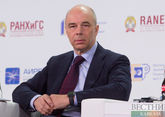The Russian government approved the draft amendment to the the bill on federal budget for 2018 and the planned period of 2019-2020. Information about this is published on the website of the Cabinet.
"The draft law provides for an increase in total revenues by 1.815 trillion rubles, including through the increase in oil and gas revenues of 1.755 trillion rubles and non-oil and gas revenues of 59.8 billion rubles. The share of revenues in relation to GDP increases by 1.7% and amounts 17,4% of GDP," the message reads.
It is specified that the total amount of expenditures will grow by 61.9 billion rubles and will amount to 16.591 trillion rubles, or 16.9% of GDP, in 2018.
The federal budget deficit this year will be replaced by a surplus of 481.8 billion rubles, or 0.5% of GDP.
In addition, the government reviewed and approved a report on the implementation of the 2017 federal budget and sent it to the Russian Accounts Chamber, RIA Novosti reported.
The vice-rector of the Academy of Labour and Social Relations Alexander Safonov, speaking to a correspondent of Vestnik Kavkaza, noted that budget surplus was achieved primarily due to high oil prices. "The level of oil prices soared to $80 per barrel yesterday, which is very high. Earlier the price fell to $30 per barrel. Thus, the amount of income in dollars sent to the treasury over these years has grown up 2,3 times, The second factor that positively influenced the formation of the budget surplus is the change in the ruble-dollar exchange rate, since the ruble exchange rate has decreased, the revenues in rubles received by the government from taxes and oil, fuel and energy products excise-duties sharply increased. Another point is the reduction of budget expenditures. Defense expenditures and social expenditures to a certain extent were reduced. It helped to balance the federal budget in terms of surplus," the expert said, adding that we already had surplus in the first quarter of this year.
"One of the main tasks that the government faces is to overcome poverty. Therefore, funds will be directed to continue the policy of keeping public sector wages at those indicators that were reached in March. And this is rather large expenditures, of more than 1 trillion rubles. Second, there has been an indexation of benefits, there will be additional benefits for the maintenance of a third child. There is also a task to ensure the incomes of working families at least below the subsistence minimum for each family member," the vice-rector of the Academy of Labour and Social Relations said.
"In 2019-2020, we should see the growth in construction costs. In 2018, the real incomes of the population may grow by 5%, which is quite good," the expert explained.
At the same time, he drew attention to the fact that certain categories of citizens will continue to face certain difficulties. "In 2018 and 2019, the income on deposits will continue to decline. Investment income of the population will fall slightly. But in general, 2019 and 2020, probably, will be positive in terms of income for us. I mean the increase in salaries in the fuel and energy complex, metallurgy, in the construction sector. And in 2020, most likely, we will see a restart of incomes in small business, which serves the production of services to the people," Alexander Safonov believes.










